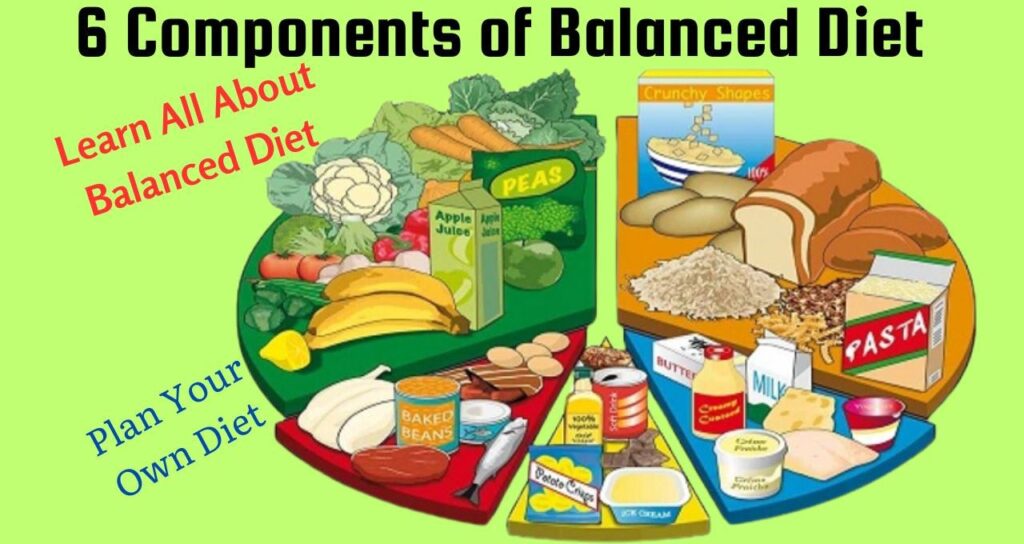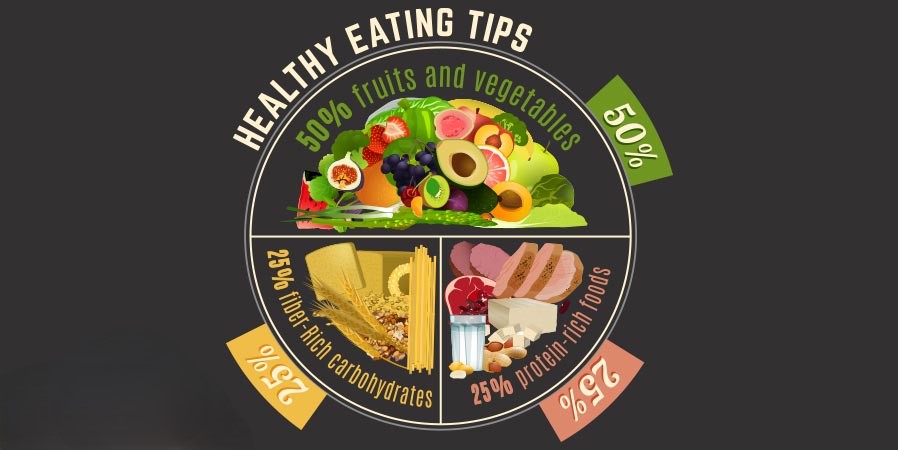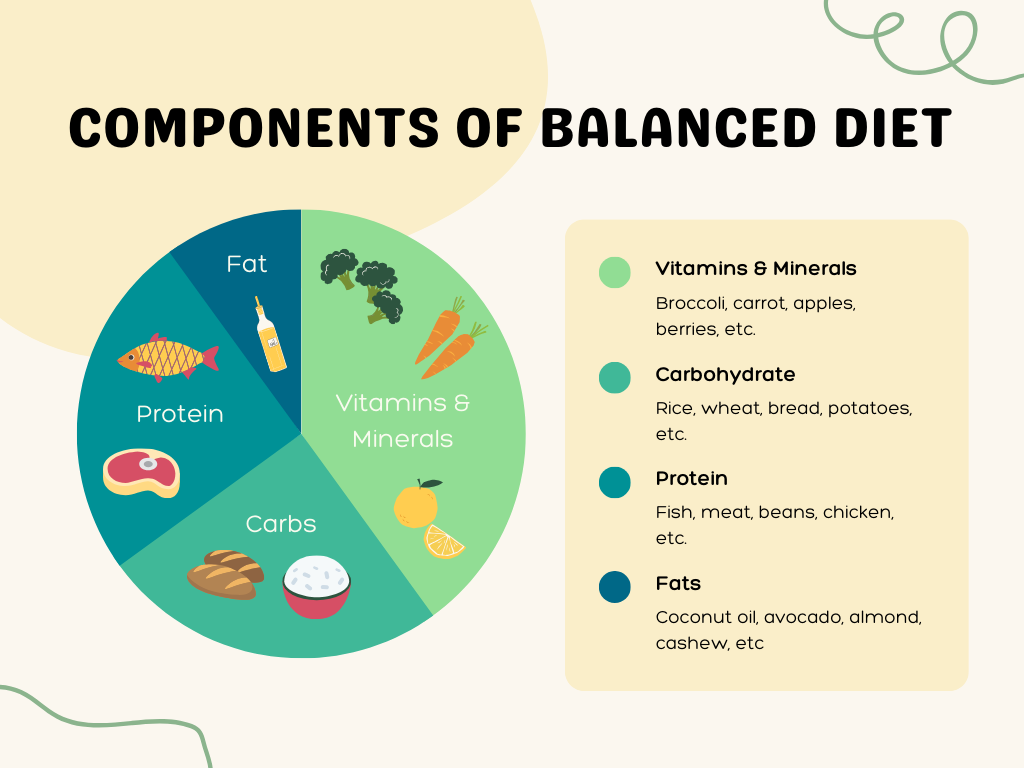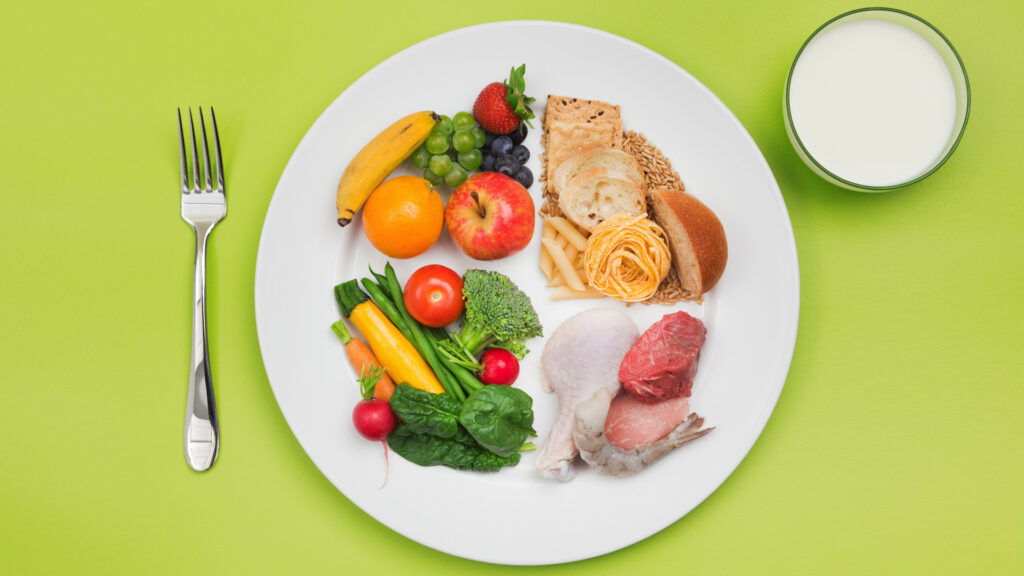Healthy eating is not about depriving oneself, starving to become unrealistically thin or denying ourselves of foods we love. The right way is to achieve a balanced diet that contains carbohydrates, proteins, fat, fibre, vitamins and minerals in the right proportions.

What is a balanced diet?
A balanced diet comprises foods from all the major food groups in the right proportions to provide the body with ideal nutrition.
Every individual is different and the right diet for good health may vary from person to person. However, by adhering to a diet that is holistic which covers all the food groups and is low in undesirable nutrients such as sodium, saturated fats, and sugar, you will be on the road to a healthy lifestyle.

Importance of well-balanced diet:
A well-balanced diet helps with sustained weight control. Calorie requirements depend on age, physical activity level, and weight goals. An appropriately balanced diet includes low-calorie, nutrient-dense foods such as whole grains, lean protein, fruits and vegetables. Here are the key benefits of consuming a well-balanced diet:
✓ Growth and Development
✓ Maintains weight
✓ Improved Energy levels
✓ Lowers Risk of Illness
✓ Decreases depression and anxiety
✓ Micronutrients-vitamins and minerals are important to boost immunity and development.
✓ Protects you from non-communicable diseases such as obesity, diabetes, cardiovascular disease, and some types of cancer.
Components of a balanced diet:

1. Carbohydrates: The Body’s Energy Source
A vital source of energy, carbohydrates comprises about 60% of an individual’s diet. Most of your energy needs are met from carbohydrates. Choose wisely from complex carbohydrate sources such as whole grains-wheat, millets, brown rice etc.
2. Proteins: The Building Blocks of Life
Protein is needed to assist your body to repair cells and make new ones. It is also essential for growth and development during the various stages of life. About 25% of daily calories should come from protein found in pulses like- moong dal, urad dhal and legumes like-kidney beans (rajma), black-eyed beans (lobia), and chickpeas (channa). Milk and milk products like -paneer, curd, and yoghurt are also a great source of protein. For the non-vegetarians, good sources include eggs, fish and lean meat.
3. Fats: The Essential Energy Reserves
Fats contribute to about 15% of daily caloric needs and are a major energy source. They are also vital for storing and providing vitamins and synthesize hormones. Some of the good sources of fats for one’s daily diet can come from polyunsaturated fats such as flax seeds, sunflower seed etc., monounsaturated fats such as olive oil, sesame oil etc., and saturated fats such as butter, and ghee – however, remember to use these in moderation.
4. Vitamins : The Micronutrient Powerhouses
Key Vitamins include A (for vision and immune function), B (for various metabolic processes), C (for immune health and collagen production), D (for bone health), E (as an antioxidant), and K (for blood clotting).
Role:
Vitamins are essential for various bodily functions. For instance, vitamin C supports the immune system, while vitamin D aids in calcium absorption and bone health.
Daily Allowance:
Daily requirements vary by vitamin and age. For example, the recommended daily allowance (RDA) for vitamin C is 75-90 mg for adults, and for vitamin D, it’s 600-800 IU.
Dietary Sources:
A. Vitamin A:
- Vegetarian Sources: Carrots, Sweet Potatoes, Spinach and Leafy greens
- Non-vegetarian Sources: Liver, Fish
B. Vitamin B (Various B Vitamins):
- Vegetarian Sources: Legumes, Whole Grains, Nuts and Seeds
- Non-vegetarian Sources: Lean Meats, Fish
C. Vitamin C:
- Vegetarian Sources: Citrus Fruits (i.e. Oranges, grapefruits, and lemons) and Berries (i.e. Strawberries, blueberries, and raspberries)
- Non-vegetarian Sources: Fish: Some fish, like mackerel, contain vitamin C.
D. Vitamin D:
- Vegetarian Sources: Fortified Foods: Some vegetarian foods, like fortified plant-based milk and cereals
- Non-vegetarian Sources: Fatty Fish: salmon and mackerel and Egg Yolks
E. Vitamin E:
- Vegetarian Sources: Nuts and Seeds: Almonds and sunflower. Spinach
- Non-vegetarian Sources: Salmon
F. Vitamin K:
- Vegetarian Sources: Leafy Greens: Kale, spinach, and broccoli
- Non-vegetarian Sources: Animal liver
5. Minerals: The Silent Regulators
Essential minerals include calcium (for strong bones), iron (for oxygen transport), potassium (for nerve and muscle function), and many others, each with its unique function in the body.
Role:
Minerals are crucial for various functions, such as maintaining strong bones (calcium), aiding oxygen transport (iron), and regulating blood pressure (potassium).
Daily Allowance:
The daily requirements for minerals vary significantly. For instance, the RDA for calcium is around 1000-1300 mg for adults, while the recommended daily intake of iron is approximately 8-18 mg for adult women and 8 mg for adult men.
Dietary Sources:
A. Calcium:
Vegetarian Sources:
- Dairy Products: Milk, yogurt, and cheese
- Leafy Greens: Collard greens, kale, and bok choy
- Fortified Foods: Some plant-based milk alternatives
Non-vegetarian Sources:
- Sardines, Salmon
B. Iron:
Vegetarian Sources:
- Legumes: Lentils, chickpeas, and kidney beans
- Leafy Greens: Spinach and kale contain non-heme iron.
- Fortified Foods: Some breakfast cereals are fortified with iron.
Non-vegetarian Sources:
- Lean Meats: Beef, chicken, and turkey
- Fish: Fatty fish like tuna and mackerel
C. Potassium:
Vegetarian Sources:
- Bananas
- Legumes: Beans and lentils;
- Potatoes: Potatoes & sweet potatoes.
Non-vegetarian Sources:
- Fish: Salmon and tuna contain potassium.
D. Magnesium:
Vegetarian Sources:
- Nuts and Seeds: Almonds, cashews, and sunflower seeds
- Leafy Greens: Spinach and Swiss chard
- Whole Grains: Whole wheat, brown rice, and oats
Non-vegetarian Sources:
- Fish: Mackerel and pollock are sources of magnesium.
E. Zinc:
Vegetarian Sources:
- Legumes: Lentils, chickpeas, and beans
- Nuts and Seeds: Pumpkin seeds and cashews
Non-vegetarian Sources:
- Lean Meats: Beef, pork, and chicken
F. Iodine:
Vegetarian Sources:
- Seaweed: Some types of seaweed, like kelp
Non-vegetarian Sources:
- Fish: Seafood, especially cod and tuna
6. Water: The Elixir of Life
Life without water is unimaginable. A major nutritional component that helps regulate body temperature, lubricate your joints and protects your major organs, and tissues. Water also aids to transport oxygen throughout your body. Make sure that you drink at least 8 glasses of water every day.
Role:
Water is the body’s essential solvent, facilitating digestion, regulating temperature, transporting nutrients, and maintaining overall bodily functions.
Daily Allowance:
The recommended daily water intake varies, but a common guideline is 8 cups (64 ounces) for adults, although individual needs differ based on factors like activity level, climate, and health status.
Steps for A Healthier You:
1. Make half your grains whole and complex.
2. Include healthy proteins-milk and milk products, pulses and lean meats.
3. Eat more colourful vegetables and fruits.
4. Limit the intake of processed foods and cut down extra salt and sugar.
5. Eat intelligently, watch what you eat.
6. Fix times to have meals and stick to it.
7. More important eat only when you feel hungry.
A balanced diet supplies the human body with essential nutrients that your body needs to work effectively. If you are having an unbalanced diet, the system is prone to disease, infection, fatigue, and poor performance. Children who are deprived of healthy foods may face growth and developmental issues, poor academic performance and highly prone to persistent infections.
Health Benefits Of a Balanced Diet
Choosing a balanced and varied diet is a vital step towards leading a happy and disciplined lifestyle.
Vitamins and minerals in the diet are essential for building a robust immune system and healthy bodily functions.
A balanced diet can safeguard the body against certain types of chronic diseases such as obesity, diabetes, heart diseases, cancers, and other conditions.
A healthy diet supports maintaining an ideal body weight.
The benefits of eating balanced and varied foods uplift emotional and mental well-being.
Foods To Avoid:
Some of the food groups to stay away from on a balanced diet include:
Processed foods
Refined grains
Added sugar and salt
Red and processed meat
Alcohol
Trans and saturated fats
Frequently Asked Questions
What Are The 7 Balanced Diet Foods?
The seven key food components comprise:
Fruits and Vegetables: Provide vitamins, minerals, fiber, and antioxidants. Aim for a variety of colors and types.
Proteins: Include lean meats, fish, eggs, beans, and nuts for muscle repair and growth.
Dairy: Opt for low-fat milk, yogurt, and cheese for calcium, phosphorus, and vitamin D, promoting strong bones and teeth.
Healthy Fats: Choose sources like avocados, nuts, seeds, and olive oil for essential fatty acids and overall health.
Legumes: Incorporate lentils, peas, and legumes for plant-based protein, fiber, and essential nutrients.
Hydration: Maintain good hydration with water, essential for all bodily functions and overall health.
What Are The 5 Importance Of A Balanced Diet ?
A balanced diet guarantees the body gets macronutrients and micronutrients necessary for growth, repair, and maintenance.
Good nutrition offers the energy needed for daily activities and essential bodily functions.
Having a balanced and varied diet is proven to the risk of lifestyle disorders like heart disease, diabetes, and certain cancers.
Eating a wholesome and varied diet helps maintain a healthy weight and prevents obesity.
Proper nutrition is associated with better mental health, mitigating the risk of depression and anxiety disorders.
What Are 5 Balanced Foods?
Some of the five wholesome foods that should be part of a balanced diet include oatmeal, salmon, leafy greens, quinoa and Greek yogurt.


